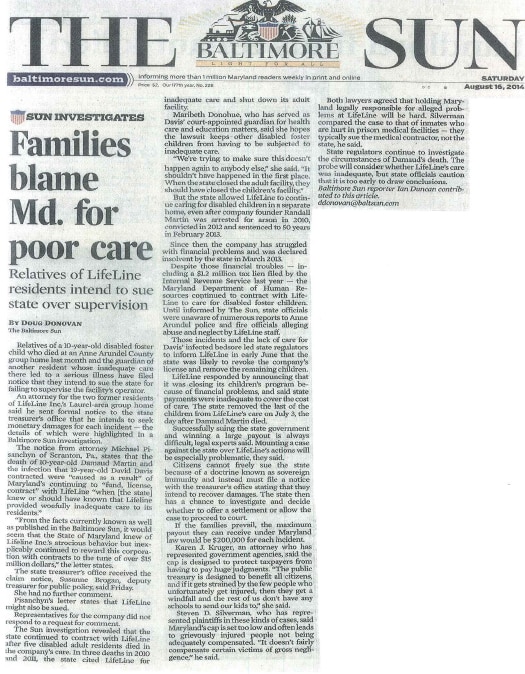RELATIVES OF LIFELINE RESIDENTS INTEND TO SUE STATE OVER SUPERVISION
By Doug Donovan | The Baltimore Sun
Relatives of a 10-year-old disabled foster child who died at an Anne Arundel County group home last month and the guardian of another resident whose inadequate care there led to a serious illness have filed notice that they intent to sue the state for failing to supervise the facility’s operator.
An attorney for the two former residents of LifeLline Inc.’s Laurel-area group home said he sent formal notice to the state treasurer’s office that he intends to seek monetary damages for each incident – the details of which were highlighted in a Baltimore Sun investigation.
The notice from attorney Michael Pisanchyn of Scranton, PA., states that the death of 10-year-old Damand Martin and the infection that 19-year old David Davis were “caused as a result” of Maryland’s continuing to “fund, license, contract” with LifeLine “when knew or should have known the LifeLine provided woefully inadequate care to its residents.”
 “From the facts currently known as well as published in the Baltimore Sun, it would seem that the State of Maryland knew of LifeLine Inc.’s atrocious behavior but inexplicably continued to reward this corporation with contracts to the tune of over $15 million dollars,” the letter states.
“From the facts currently known as well as published in the Baltimore Sun, it would seem that the State of Maryland knew of LifeLine Inc.’s atrocious behavior but inexplicably continued to reward this corporation with contracts to the tune of over $15 million dollars,” the letter states.
The state treasurer’s office received the claim notice, Susanne Brogan, deputy treasurer for public policy, said Friday.
She had no further comment.
Pisanchyn’s letter states that LifeLine might also be sued.
Representatives for the company did not respond to a request for comment.
The Sun investigation revealed that the state continued to contract with LifeLine after five disabled adult residents died in the company’s care. In three deaths in 2010 and 2011, the state cited LifeLine for inadequate care and shut down its adult facility.
Maribeth Donahue, who has served as Davis’ court-appointed guardian for health care and education matters, said she hopes the lawsuit keeps other disabled foster children from having to be subjected to inadequate care.
“We’re trying to make sure this doesn’t happen again to anybody else,” she said. “It shouldn’t have happened in the first place. When the state closed the adult facility, they should have closed the children’s facility.”
But the state allowed LifeLine to continue caring for disabled children in a separate home, even after company founder Randall Martin was arrested for arson in 2010, convicted in 2012 and sentenced to 50 years in February 2013.
Since then the company has struggled with financial problems and was declared insolvent by the state in March 2013.
Despite those financial troubles – including a $1.2 million tax lien filed by the Internal Revenue Service lasy year – the Maryland Department of Human Resources continued to contract with LifeLine to care for disabled foster children. Until informed by The Sun, state officials were unaware of numerous reports to Anne Arundel police and fire officials alleging abuse and neglect by LifeLine staff.
Those incidents and the lack of c are for Davis’ infected bedsore led state regulators to inform LifeLine in early June that the state was likely to revoke the company’s license and remove the remaining children.
LifeLine responded by announcing that it was closing its children’s program because of financial problems, and said state payments were inadequate to cover the cost of care. The state removed the last of the children from LifeLine’s care on July 3, the day after Demaud Martin died.
Successfully suing the state government and winning a large payout is always difficult, legal experts said. Mounting a case against the state over LifeLine’s actions will be especially problematic, they said.
Citizens cannot freely sue the state because of a doctrine known as sovereign immunity and instead must file a notice with the treasurer’s office stating taht they intend to recover damages. The state then has a chance to investigate and decide whether to offer a settlement or allow the case to proceed to court.
If the families prevail, the maximum payout they can receive under Marlyand law would be $200,000 for each incident.
Karen J. Kruger, an attorney who has represented government agencies, said the cap is designed to protect taxpayers from having to pay huge judgments. “The public treasury is designed to benefit all citizens, and if it gets strained by the few people who unfortunately get injured, then they get a windfall and the rest of us don’t have any schools to send our kids to,” she said.
Steven D. Silverman, who has represented plaintiffs in these kinds of cases, said Maryland’s cap is set too low and often leads to grievously injured people not being adequately compensated. “It doesn’t fairly compensate certain victims of gross negligence.”
Bother lawyers agreed that holding Maryland legall responsible for alleged problems at LifeLine will be hard. Silverman compared he case to that of inmates who are hurt in prison medical facilities – they typically sue the medical contractor, not the state, he said.
State regulators continue to investigate the circumstances of Damaud’s death. The probe will consider whether LifeLine’s care was inadequate, but state officials caution that it is too early to draw conclusions.





